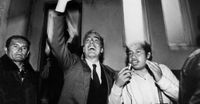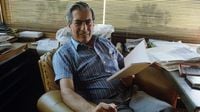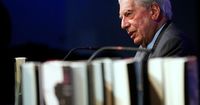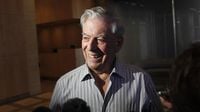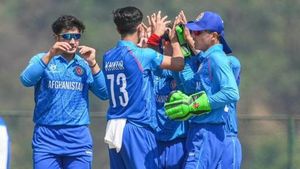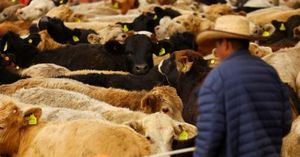Mario Vargas Llosa, the celebrated Peruvian author and Nobel Prize laureate, passed away on April 13, 2025, at the age of 89 in Lima, surrounded by his family. His children, Álvaro, Gonzalo, and Morgana Vargas Llosa, shared the news in a heartfelt statement on social media, expressing their sorrow while celebrating his long and fruitful life. "It is with deep sorrow that we announce that our father, Mario Vargas Llosa, passed away peacefully in Lima today, surrounded by his family," the statement read. They noted that his remains will be cremated and there will be no public ceremony, adding, "His departure will sadden his relatives, his friends, and his readers around the world, but we hope that they will find comfort, as we do, in the fact that he enjoyed a long, adventurous and fruitful life, and leaves behind him a body of work that will outlive him."
Born on March 28, 1936, in Arequipa, Peru, Vargas Llosa was a towering figure in Latin American literature, known for his incisive explorations of power, corruption, and individual liberty. He first gained prominence with his groundbreaking novel "The Time of the Hero" (1963), which drew on his experiences at a military academy and faced immediate backlash from military authorities, who even burned copies of the book. This debut novel firmly placed him among the leading voices of the Latin American literary boom, alongside contemporaries like Gabriel García Márquez and Julio Cortázar.
Vargas Llosa's literary career spanned over five decades, during which he produced a remarkable body of work, including celebrated novels such as "Conversation in the Cathedral" (1969), "The War of the End of the World" (1981), and "Aunt Julia and the Scriptwriter" (1977). The latter was adapted into the 1990 film "Tune in Tomorrow," starring Barbara Hershey and Keanu Reeves. His literary prowess earned him numerous accolades, culminating in the Nobel Prize in Literature in 2010, awarded for his "cartography of structures of power and his trenchant images of the individual’s resistance, revolt, and defeat."
Vargas Llosa's early life was marked by a complex family dynamic. His father, Ernesto Vargas, left the family before his birth, and his mother, Dora Llosa, took him to Bolivia to avoid scandal. Vargas Llosa later described his upbringing as "somewhat traumatic," yet it was rich with literary influences that shaped his future. He began writing at a young age, and by 15, he was working as a crime reporter for the newspaper La Crónica. His experiences in journalism informed much of his fiction, particularly the themes of social injustice and political corruption.
His foray into politics began in the 1990s when he ran for the presidency of Peru. Vargas Llosa campaigned on a platform of classical liberalism, advocating for individual freedoms and economic reforms. However, he was defeated in the runoff election by Alberto Fujimori, a little-known candidate at the time who later became a controversial figure in Peruvian politics. Vargas Llosa's political ambitions did not deter him from his literary pursuits, and he continued to write prolifically even after moving to Spain, where he became a Spanish citizen in 1993.
Throughout his career, Vargas Llosa remained a vocal critic of leftist regimes in Latin America, including Cuba under Fidel Castro, whom he once supported but later denounced. His political views often alienated him from some of his literary peers, particularly during the height of the Latin American leftist movements. In a notable incident in 1976, he physically confronted García Márquez over their differing political beliefs, a clash that became emblematic of the ideological rifts within Latin American literature.
Despite his political controversies, Vargas Llosa's literary contributions have left an indelible mark on the world of literature. His novels often explore the complexities of Peruvian society, blending personal experiences with broader historical narratives. Works like "The Feast of the Goat" delve into the brutal regime of Dominican dictator Rafael Trujillo, while "The War of the End of the World" examines a historical conflict in Brazil, showcasing Vargas Llosa's ability to intertwine fiction with significant historical events.
In addition to his novels, Vargas Llosa was a prolific essayist and journalist. His political commentary appeared in various publications, including his regular column "Piedra de Toque," which addressed contemporary issues in Latin America and beyond. He believed that literature and politics were intertwined, asserting that art could sensitize people to the injustices of the world.
Vargas Llosa's personal life was as colorful as his fiction. He eloped with his aunt by marriage, Julia Urquidi, at the age of 19, a relationship that inspired his novel "Aunt Julia and the Scriptwriter." He later married his first cousin, Patricia Llosa, with whom he had three children. After 50 years of marriage, they divorced in 2015, and Vargas Llosa began a relationship with Spanish socialite Isabel Preysler, which ended in 2022.
His last published novel, "Harsh Times" (Tiempos Recios), came out in 2019, and he announced in 2023 that it would be his final work. In an interview, he expressed a deep love for literature, stating, "An author's work is fed by his own experience and, over the years, becomes richer." Vargas Llosa's legacy as a writer and thinker will undoubtedly endure, as he leaves behind a wealth of literature that continues to resonate with readers around the globe.
As the literary world mourns the loss of Mario Vargas Llosa, his contributions to literature and political thought remain a testament to his enduring influence. His works will continue to inspire future generations of writers and readers, ensuring that his voice echoes long after his passing.

